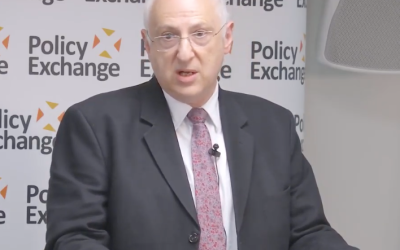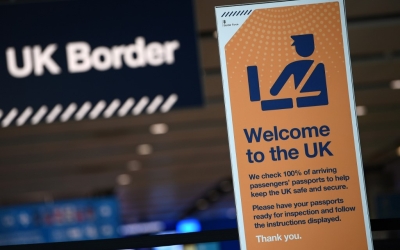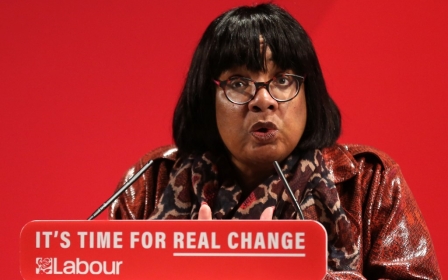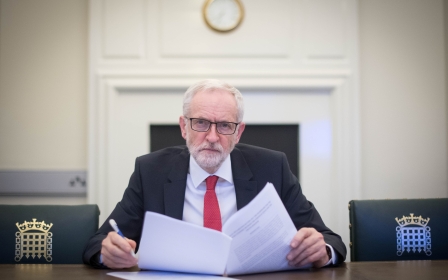EXCLUSIVE: UK government facing legal challenge over Prevent review

The British government is facing a legal challenge over its nomination of a vocal advocate of the Prevent strategy to conduct a review of the contentious counter-extremism programme, Middle East Eye can reveal.
Rights Watch (UK), a human rights organisation, told MEE on Wednesday that it had been granted permission in the High Court to launch a judicial review into the Home Office’s appointment in August of Lord Carlile, a former terrorism legislation watchdog.
Carlile also conducted a review of Prevent in 2011 and in May described calls for a new review of the strategy as “completely unnecessary”.
Yasmine Ahmed, the director of Rights Watch (UK), told MEE she welcomed the Home Office conceding to the judicial review without challenge.
"The fact that the government have conceded permission for this case to go forward demonstrates the strength of our challenge," said Ahmed.
New MEE newsletter: Jerusalem Dispatch
Sign up to get the latest insights and analysis on Israel-Palestine, alongside Turkey Unpacked and other MEE newsletters
“To appoint Lord Carlile to the position of independent reviewer is a serious misjudgment by the secretary of state for the Home Office, and suggests the government has failed to grapple with what the review was intended to achieve."
The Home Office confirmed to MEE that it had conceded permission for judicial review proceedings, but not the case itself.
The government agreed to commission an independent review of Prevent as part of legislation contained within this year’s Counter-Terrorism and Border Security Act that was passed by parliament in response to widespread criticism of the strategy among rights groups and Muslim advocacy organisations.
Rights Watch (UK) argues that Lord Carlile’s appointment is unlawful because he cannot be considered independent due to his public support for and involvement in the delivery of the Prevent strategy.
What is the Prevent Strategy?
+ Show - HidePrevent is a programme within the British government's counter-terrorism strategy that aims to “safeguard and support those vulnerable to radicalisation, to stop them from becoming terrorists or supporting terrorism”.
It was publicly launched in the aftermath of the 2005 London bombings and was initially targeted squarely at Muslim communities, prompting continuing complaints of discrimination and concerns that the programme was being used to collect intelligence.
In 2011, Prevent's remit was expanded to cover all forms of extremism, defined by the government as “vocal or active opposition to fundamental British values, including democracy, the rule of law, individual liberty and mutual respect and tolerance of different faiths and beliefs.”
In 2015, the government introduced the Prevent Duty which requires public sector workers including doctors, teachers and even nursery staff to have “due regard to the need to prevent people being drawn into terrorism”.
A key element of Prevent is Channel, a programme that offers mentoring and support to people assessed to be at risk of becoming terrorists. Prevent referrals of some young children have proved contentious. 114 children under the age of 15 received Channel support in 2017/18.
Criticism of the Prevent Duty includes that it has had a “chilling effect” on free speech in classrooms and universities, and that it has turned public sector workers into informers who are expected to monitor pupils and patients for “signs of radicalisation”. Some critics have said that it may even be counter-productive.
Advocates argue that it is a form of safeguarding that has been effective in identifying and helping troubled individuals. They point to a growing number of far-right referrals as evidence that it is not discriminatory against Muslims.
In January 2019 the government bowed to pressure and announced that it would commission an independent review of Prevent. This was supposed to be completed by August 2020. After being forced to drop its first appointed reviewer, Lord Carlile, over his past advocacy for Prevent, it conceded that the review would be delayed.
In January 2021 it named William Shawcross as reviewer. Shawcross's appointment was also contentious and prompted many organisations to boycott the review. Further delays followed. Shawcross's review, calling for a renewed focus within Prevent on "the Islamist threat", was finally published in February 2023 - and immediately denounced by critics.
Following his appointment in August, MEE reported that Carlile was a member of the Prevent Oversight Board which sits within the Home Office and is responsible for enforcing the implementation of Prevent work by public bodies.
In a debate in the House of Lords last December, Carlile said that he had “played a part” in the creation of the current iteration of the strategy, and questioned whether there was a public interest in an independent review.
He also suggested that the role should fall within the remit of the existing independent reviewer of counter-terrorism legislation, saying that the work would be a matter of a “few extra days”.
In May 2019, he described the appointment of a Prevent reviewer as “completely unnecessary” and said that criticism of the strategy was based on “fictitious... evidence”, according to the claim filed by Rights Watch (UK).
The claim also notes that many of the current issues of contention surrounding Prevent, including its broadened remit to tackle non-violent extremism and the 2015 Prevent Duty, which requires public sector bodies to have “due regard of the need to prevent people being drawn into terrorism”, were introduced as a consequence of recommendations made by Carlile in his 2011 review.
'Soft surveillance tool'
Prevent has long been criticised over complaints that it is discriminatory against Muslims, and has attracted the attention of international human rights watchdogs and advocacy organisations.
The Prevent Duty has also faced scrutiny over concerns that it has had a chilling effect on free speech and freedom of expression in universities and schools.
Rights Watch (UK) described the strategy as a "soft surveillance tool used against impacted communities including children".
Advocates argue that it is a form of safeguarding and say that it also tackles far-right and other forms of extremism.
However, the effectiveness of the government's approach to counter-terrorism is once again under scrutiny after a man released from prison midway through a sentence for terrorism offences killed two people in a stabbing attack before being shot dead by police on London Bridge last week.
The man was later revealed to have been engaged in a compulsory Home Office deradicalisation scheme for prisoners assessed to hold beliefs deemed to be extremist, called the Desistance and Disengagement Programme.
In calling for a fully independent review, Rights Watch (UK) noted that its purpose was also to resolve the “seemingly intractable debate” surrounding the strategy “and to ensure that those within affected communities will feel that their concerns have been addressed by a fair, neutral and independent reviewer with no stake in the outcome of the review”.
Rights Watch (UK) also called for a review of the independent reviewer's terms of reference, noting that by asking how Prevent could be improved in response to criticism it appeared to presuppose that the reviewer would conclude that the strategy ought to continue.
Ahmed told MEE that she hoped the judicial review could take place in January next year in order to allow time for an independent review of Prevent to be completed in time to meet a statutory deadline of 20 August 2020.
Rights Watch (UK) said it was fundraising to support the case, which it described as a last chance to ensure that the government delivered a fully independent review.
"We are concerned that the government have stacked the cards in their favour so that the review will not only operate as a rubber-stamp to the current policy but like the last review, which was also overseen by Lord Carlile, will provide the basis to expand it’s remit and reach," said Ahmed.
Lord Dubs, a Labour peer who called for an independent review of Prevent to be commissioned in 2017 over concerns about the impact of the Prevent Duty in universities, told MEE that he welcomed the judicial review.
“I think there are so many concerns about the Prevent Strategy that it is urgent that there should be a fully independent review of how it is working, taking into account the sensitivities of the Muslim population,” Dubs said.
“I, therefore, support the idea of a judicial review which is after all intended to establish a totally independent process of looking at this, which is not what the government seems to have in mind.”
Yasmin Qureshi, Labour's justice spokesperson and a parliamentary candidate in next week's election, said that the process of appointing a reviewer needed to be transparent.
"You have to have someone who the community has confidence in," she told MEE.
MEE contacted Lord Carlile but his office referred MEE to the Home Office for comment. MEE also contacted the Conservative Party, which has been in office since 2o10, which also referred MEE to the Home Office. The Home Office declined to comment on the basis that the legal proceedings are ongoing.
Commenting to MEE in August at the time of Carlile's appointment, a spokesperson said Carlile’s membership of the Prevent Oversight Board gave him “useful experience” in conducting the review.
“His independence and capacity for making evidence-based judgments are a matter of record.”
Middle East Eye delivers independent and unrivalled coverage and analysis of the Middle East, North Africa and beyond. To learn more about republishing this content and the associated fees, please fill out this form. More about MEE can be found here.






